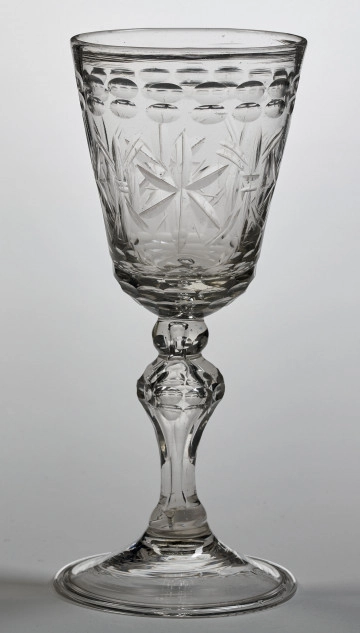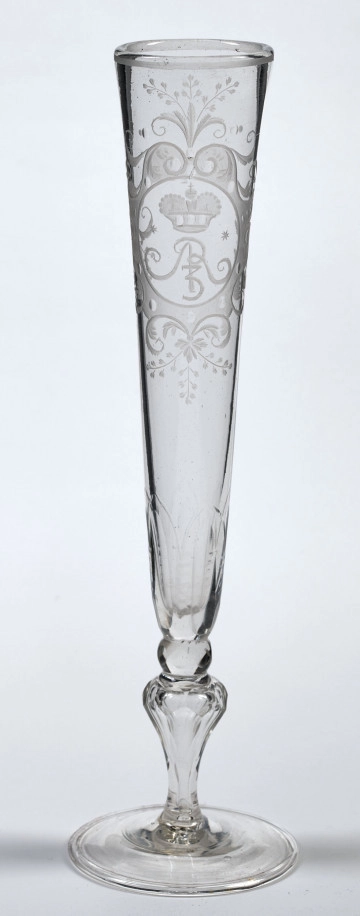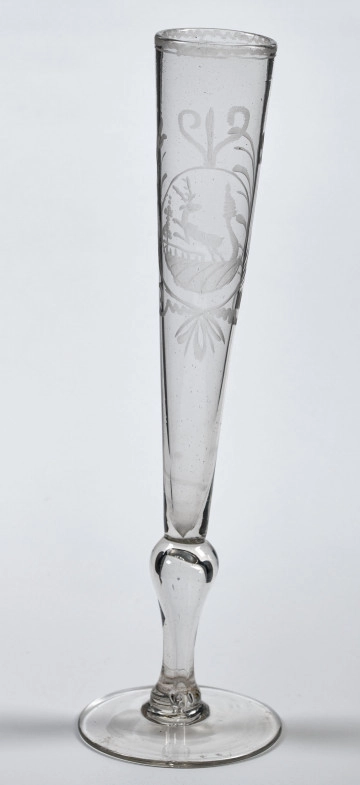
Chalice with rosettes
half of the 18th century
Castle Museum in Łańcut
Part of the collection: Glass
Chalice – flute The flute chalice was made in 1720–1730 in a glass manufacture near Lubaczów called the Crystal Glassworks, founded in 1717 by Hetman Adam Mikołaj Sieniawski. He was married to Elżbieta Lubomirska, daughter of Stanisław Herakliusz Lubomirski, the owner of Łańcut in 1699–1702. Objects from the nearby glassworks make up the most numerous group in the collection of Polish glass in Łańcut. It was one of the oldest Polish glass manufactures, which reached a very high European level in the production of its products. It was headed by Franciszek Fremel, a distinguished Saxon specialist brought to Poland in 1710 by Augustus II the Strong. The ironworks was in operation throughout the 18th century. It produced table glass and candlesticks. Among the various chalices, champagne flutes were characteristic, with a narrow and slender bowl on a baluster shaft and a round foot. The above chalice is made of colourless glass. It is a round-footed chalice with a baluster-shaped stem of solid glass, with a slender, conical bowl. The front of the bowl and the stem shaft are decorated with a facet cut. The front of the bowl is decorated with an engraved Baroque cartouche with the coat of arms of Primate Teodor Potocki – Pilawa, surmounted by a ducal mitre, against a background of ermine mantle. Above the mantle, a cardinal’s hat with two ropes symmetrically placed with ten tassels hanging down. On the back of the bowl is the Eye of Providence. The foot is decorated with a floral branch thread. There is a similar motif on the bowl. Barbara Trojnar
Author / creator
Dimensions
height: 33.8 cm
Object type
Glass
Material
glass
Creation time / dating
Creation / finding place
Owner
Castle Museum in Łańcut
Identification number
Location / status

unknown
half of the 18th century
Castle Museum in Łańcut

unknown
1st half of the 18th century
Castle Museum in Łańcut

unknown
1st half of the 18th century
Castle Museum in Łańcut
DISCOVER this TOPIC
National Museum in Szczecin
DISCOVER this PATH
Educational path
0/500

We use cookies to make it easier for you to use our website and for statistical purposes. You can manage cookies by changing the settings of your web browser. More information in the Privacy Policy.
We use cookies to make it easier for you to use our website and for statistical purposes. You can manage cookies by changing the settings of your web browser. More information in the Privacy Policy.
Manage cookies:
This type of cookies is necessary for the website to function. You can change your browser settings to block them, but then the website will not work properly.
WYMAGANE
They are used to measure user engagement and generate statistics about the website to better understand how it is used. If you block this type of cookies, we will not be able to collect information about the use of the website and we will not be able to monitor its performance.